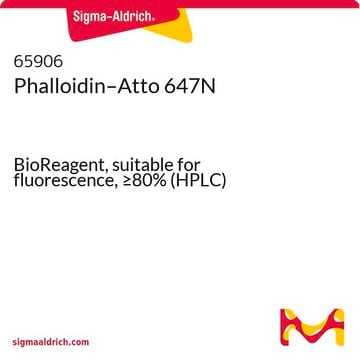Összes fotó(1)
Fontos dokumentumok
07373
Phalloidin–Atto 740
BioReagent, suitable for fluorescence
Szinonimák:
Atto 740–Phalloidin
Bejelentkezésa Szervezeti és Szerződéses árazás megtekintéséhez
Összes fotó(1)
About This Item
UNSPSC kód:
12352108
NACRES:
NA.32
Javasolt termékek
termékcsalád
BioReagent
Minőségi szint
Teszt
≥90.0% (HPLC)
Forma
powder
gyártó/kereskedő neve
ATTO-TEC GmbH
áteresztőképesség
254 nm
740 nm
fluoreszcencia
λex 750 nm; λem 764 nm in 0.1 M phosphate pH 7.0
UV-elnyelés
λ: 739 -745 nm Amax
alkalmasság
suitable for fluorescence
tárolási hőmérséklet
−20°C
Általános leírás
Atto 740 belongs to a new generation of fluorescent labels for the near infrared spectral region. The dye is designed for application in the area of life science, e.g. labeling of DNA, RNA or proteins. Characteristic features of the dye are strong absorption and good fluorescence as well as excellent thermal and photo-stability. Atto 740 is a cationic dye. After coupling to a substrate the dye carries a net electrical charge of +1.
Atto 740 is a pH sensitive product. While practically stable up to pH 7.4 (PBS-buffer), it slowly degrades at higher pH. If exposed to higher pH for coupling purposes, we recommend reducing the pH immediately after completion of the reaction.
Phalloidin is a fungal toxin isolated from the poisonous mushroom Amanita phalloides. Its toxicity is attributed to the ability to bind F actin in liver and muscle cells. As a result of binding phalloidin, actin filaments become strongly stabilized. Phalloidin has been found to bind only to polymeric and oligomeric forms of actin, and not to monomeric actin. The dissociation constant of the actin-phalloidin complex has been determined to be on the order of 3 x 10-8. Phalloidin differs from amanitin in rapidity of action; at high dose levels, death of mice or rats occurs within 1 or 2 hours. Fluorescent conjugates of phalloidin are used to label actin filaments for histological applications. Some structural features of phalloidin are required for the binding to actin. However, the side chain of amino acid 7 (g-d-dihydroxyleucine) is accessible for chemical modifications without appreciable loss of affinity for actin.
find more information here
Atto 740 is a pH sensitive product. While practically stable up to pH 7.4 (PBS-buffer), it slowly degrades at higher pH. If exposed to higher pH for coupling purposes, we recommend reducing the pH immediately after completion of the reaction.
Phalloidin is a fungal toxin isolated from the poisonous mushroom Amanita phalloides. Its toxicity is attributed to the ability to bind F actin in liver and muscle cells. As a result of binding phalloidin, actin filaments become strongly stabilized. Phalloidin has been found to bind only to polymeric and oligomeric forms of actin, and not to monomeric actin. The dissociation constant of the actin-phalloidin complex has been determined to be on the order of 3 x 10-8. Phalloidin differs from amanitin in rapidity of action; at high dose levels, death of mice or rats occurs within 1 or 2 hours. Fluorescent conjugates of phalloidin are used to label actin filaments for histological applications. Some structural features of phalloidin are required for the binding to actin. However, the side chain of amino acid 7 (g-d-dihydroxyleucine) is accessible for chemical modifications without appreciable loss of affinity for actin.
find more information here
Kiszerelés
Bottomless glass bottle. Contents are inside inserted fused cone.
Jogi információk
This product is for Research use only. In case of intended commercialization, please contact the IP-holder (ATTO-TEC GmbH, Germany) for licensing.
Nem találja a megfelelő terméket?
Próbálja ki a Termékválasztó eszköz. eszközt
Tárolási osztály kódja
11 - Combustible Solids
WGK
WGK 3
Lobbanási pont (F)
Not applicable
Lobbanási pont (C)
Not applicable
Válasszon a legfrissebb verziók közül:
Már rendelkezik ezzel a termékkel?
Az Ön által nemrégiben megvásárolt termékekre vonatkozó dokumentumokat a Dokumentumtárban találja.
Tudóscsoportunk valamennyi kutatási területen rendelkezik tapasztalattal, beleértve az élettudományt, az anyagtudományt, a kémiai szintézist, a kromatográfiát, az analitikát és még sok más területet.
Lépjen kapcsolatba a szaktanácsadással






